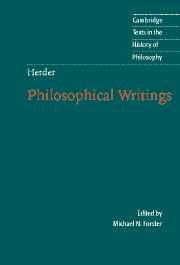Book contents
- Frontmatter
- Contents
- Introduction
- Chronology
- Further reading
- Note on the texts and translation
- Part I General Philosophical Program
- Part II Philosophy of Language
- Fragments on Recent German Literature (1767–8) [excerpts on language]
- Treatise on the Origin of Language (1772)
- Part III Philosophy of Mind
- Part IV Philosophy of History
- Part V Political Philosophy
- Index
- Cambridge texts in the history of philosophy
Fragments on Recent German Literature (1767–8) [excerpts on language]
Published online by Cambridge University Press: 05 June 2012
- Frontmatter
- Contents
- Introduction
- Chronology
- Further reading
- Note on the texts and translation
- Part I General Philosophical Program
- Part II Philosophy of Language
- Fragments on Recent German Literature (1767–8) [excerpts on language]
- Treatise on the Origin of Language (1772)
- Part III Philosophy of Mind
- Part IV Philosophy of History
- Part V Political Philosophy
- Index
- Cambridge texts in the history of philosophy
Summary
It remains generally true: “The exactitude of a language diminishes its richness.” And in order to make this obvious we may compare the oldest language, the Hebraic or Arabic language, with our language in respect to richness; the richness is as different as the domestic economies of those regions and ours. They collected livestock and slaves, we collect gold and household equipment; it is the same with the richness of the two languages.
Their language is rich in livestock. In it names of natural things are frequent. In the small book of the Hebrews, which is all that we still have remaining, there are already 250 botanical words, names which our language can indeed express but does not know how to express, because the kaloi k'agathoi of our bourgeois world devote themselves to anything rather than gathering shepherds' knowledge, because our natural philosophers live among books and are again turning to Latin books. Our bucolic poets and singers of nature therefore cannot pluck the flowers of these plants; even if we had German names, they would not be familiar enough, they would not have enough poetic dignity, for our poems are no longer written for shepherds but for city-dwelling Muses, our language is limited to the language of books. – On the other hand, Leibniz already noted that our language is a language of hunting and mining.
- Type
- Chapter
- Information
- Herder: Philosophical Writings , pp. 33 - 64Publisher: Cambridge University PressPrint publication year: 2002
- 3
- Cited by



